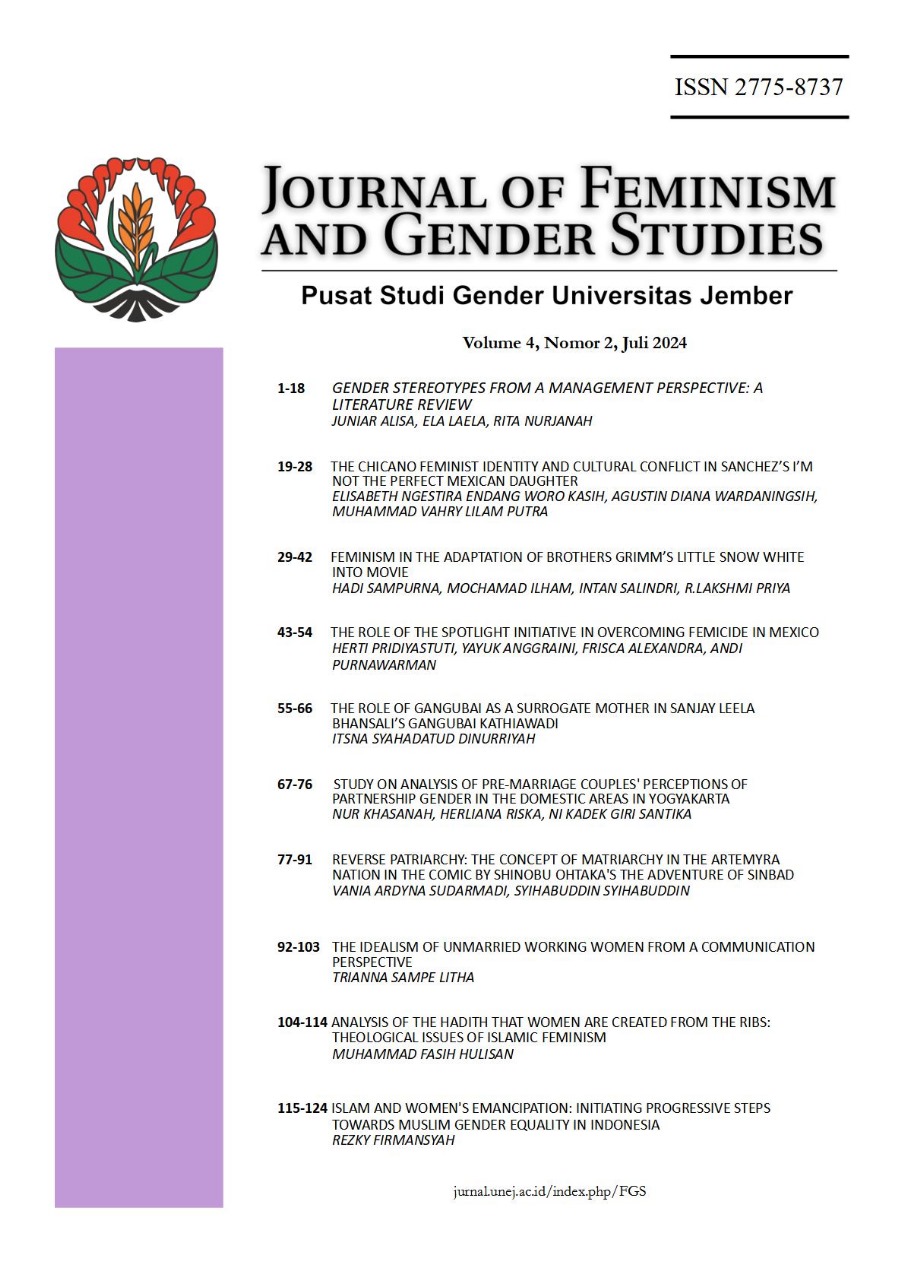The Chicano Feminist Identity and Cultural Conflict in Sanchez’s I’m Not The Perfect Mexican Daughter
Abstract
This research delves into feminist themes within the novel "I'm not the Perfect Mexican Daughter," focusing on the depiction of women through the perspectives of two key female characters. Employing feminist literary analysis, the study investigates how Chicana women are represented in a society entrenched in patriarchal norms. Drawing from Garcia’s Chicana feminist and Tong’s feminist theories, it argues that women occupy subordinate positions due to entrenched male dominance. Despite advancements in the public sphere, Chicano women are still expected to adhere to traditional family roles, being judged primarily on physical appearance. Men are portrayed as dominant figures, wielding power in economic and social realms. Through the lives of the main characters, the novel highlights the challenges and contradictions faced by Chicana women amidst the women's movement. It presents an idealized image of womanhood emblematic of Chicana experiences in the United States, exploring Julia's defiance of gender norms, Olga's complex negotiation between conformity and rebellion, and Ama's struggle with societal expectations.
References
Anzaldua, G. (1987). Borderlands. Aunt Lute Book Company.
Avilés, E. (2014). My/Mi lengua franca: “Language,” Manipulation, and Cultural Heritage in Chicana Art and Literature. The University of New Mexico.
Blackmore, E. (2015). Changing Frames: Engaging Multiple Identities in Cultural Conflicts. European Scientific Journal, 1(May), 403–417.
Cresswell, J. W. (2003). Research Design: Qualitative, Quantitative, and Mixed Methods. Approaches. Sage.
Garcia, A. M. (1989). The Development of Chicana Feminist Discourse, 1970-1980. Gender & Society, 3(2), 217–238.
Groenewold, M. (2005). Chicana Feminism: Self-Actualization Through Border Conscience. Intercultural Communications Studies, XIV(3), 92–100.
Henríquez-Betancor, M. (2019). Anzaldúa and ‘the new mestiza’: A Chicana dives into collective identity. Language Value, 4(2), 38–55. https://doi.org/10.6035/languagev.2012.4.2.4
Ibarrarán Bigalondo, A. (2017). The Importance of Writing as a Method of Creating Identity in Feminist Chicana Literature: Terri de la Peña’s Margins. ODISEA. Revista de Estudios Ingleses, 1, 59–64. https://doi.org/10.25115/odisea.v0i1.8
Kasih, E. N. E. W. (2018). Redefining Hybridity of Chicano Literature in Jimenez’s Fictions. The Center for Asia and Diaspora, 8(2), 293–319. https://doi.org/10.15519/dcc.2018.06.8.2.293
Lampe, P. E. (1992). Ethnic Identity and Ethnic Community Among Mexicanos. International Social Science Review, 67(3), 109–122.
Madsen, D. L. (2000). Feminist Theory and Literary Practice. Pluto Press.
Michelis, I. (2023). Contesting gender: young women and feminist generations in gender-based violence services. Journal of Gender Studies, 33(5), 621–633. https://doi.org/10.1080/09589236.2023.2186840
Peña, C., Lopez, S. R., Castañeda, E., Quintero, J. M., & Askari, M. (2023). Chicana/Latina feminism: What is it and how does it define us? New Directions for Adult and Continuing Education, 2023(180), 65–75. https://doi.org/10.1002/ace.20512
Rachman, A. (2023). Reinterpreting Feminism in Ideology and Practice. Journal of Feminism and Gender Studies, 3(1), 86. https://doi.org/10.19184/jfgs.v3i1.37501
Sanchez, E. L. (2017). I am not the Perfect Mexican Daughter. Alfred A. Knopf.
Sanchez, R. (1996). Deconstruction and Renarrativizations: Trends in Chicana Literature. Bilingual Review / La Revista Bilingüe, 21(1), 52–58.
Tong, R. (2009). Feminist Thought: A More Comprehensive Introduction. In Westview Press (The 3rd Ed). Westview Press.
Vallejos, T. (1983). Ritual Process and the Family in the Chicano Novel. MELUS, 10(4), 5–16.
Varghese, C., & Kumar, S. S. (2022). Marginality: A Critical Review of the Concept. Review of Development and Change, 27(1), 23–41. https://doi.org/10.1177/09722661221096681
Wolniak. (2023). The Concept of Descriptive Analytics. Scientific Papers of Silesian University of Technology Organization and Management Series, 2023(172), 699–715. https://doi.org/10.29119/1641-3466.2023.172.42

This work is licensed under a Creative Commons Attribution-ShareAlike 4.0 International License.











